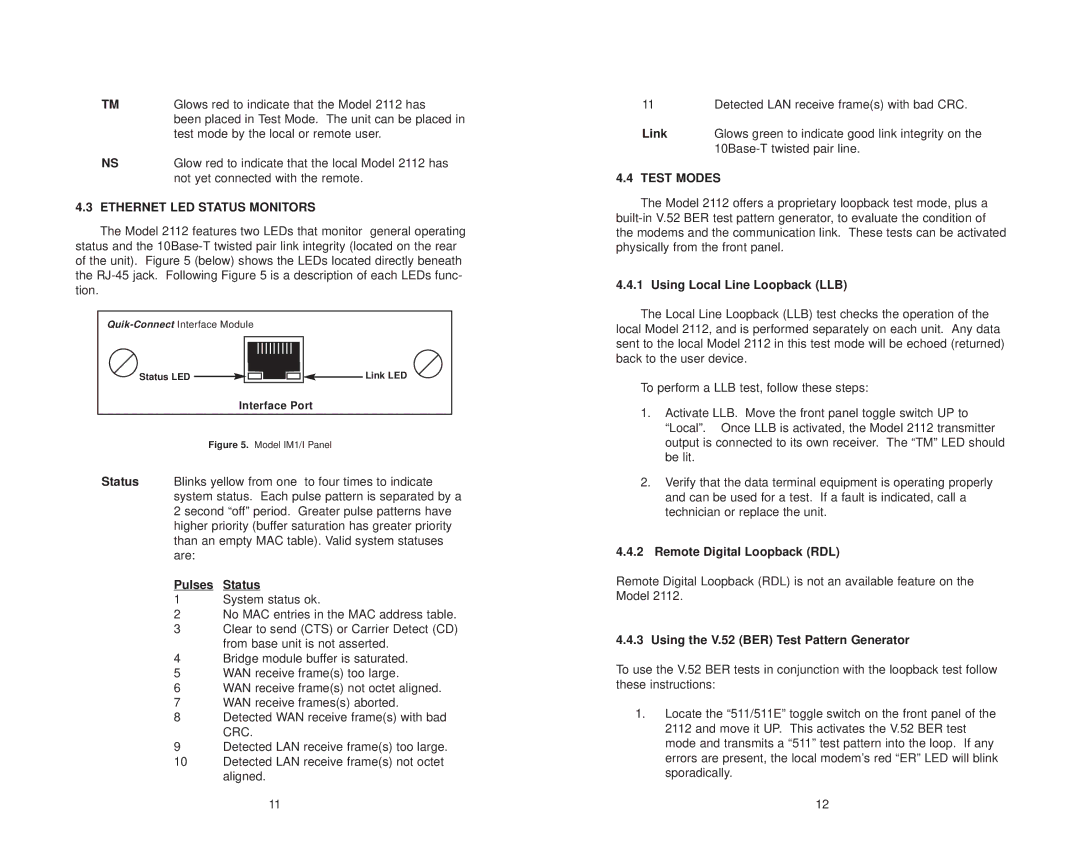
TM | Glows red to indicate that the Model 2112 has |
| been placed in Test Mode. The unit can be placed in |
| test mode by the local or remote user. |
NS | Glow red to indicate that the local Model 2112 has |
| not yet connected with the remote. |
4.3 ETHERNET LED STATUS MONITORS
The Model 2112 features two LEDs that monitor general operating status and the
|
|
|
|
|
|
|
|
|
|
|
|
|
|
|
|
|
|
|
|
| Link LED |
Status LED |
|
|
|
|
|
|
|
|
| |
|
|
|
|
| ||||||
|
|
|
|
|
|
| ||||
|
|
|
|
| ||||||
|
|
|
|
|
|
|
|
|
|
|
|
|
|
|
|
|
|
|
|
|
|
Interface Port
Figure 5. Model IM1/I Panel
Status Blinks yellow from one to four times to indicate system status. Each pulse pattern is separated by a 2 second “off” period. Greater pulse patterns have higher priority (buffer saturation has greater priority than an empty MAC table). Valid system statuses are:
Pulses Status
1System status ok.
2No MAC entries in the MAC address table.
3Clear to send (CTS) or Carrier Detect (CD) from base unit is not asserted.
4Bridge module buffer is saturated.
5WAN receive frame(s) too large.
6WAN receive frame(s) not octet aligned.
7WAN receive frames(s) aborted.
8Detected WAN receive frame(s) with bad CRC.
9Detected LAN receive frame(s) too large.
10Detected LAN receive frame(s) not octet aligned.
11
11 | Detected LAN receive frame(s) with bad CRC. |
Link | Glows green to indicate good link integrity on the |
|
4.4 TEST MODES
The Model 2112 offers a proprietary loopback test mode, plus a
4.4.1 Using Local Line Loopback (LLB)
The Local Line Loopback (LLB) test checks the operation of the local Model 2112, and is performed separately on each unit. Any data sent to the local Model 2112 in this test mode will be echoed (returned) back to the user device.
To perform a LLB test, follow these steps:
1.Activate LLB. Move the front panel toggle switch UP to “Local”. Once LLB is activated, the Model 2112 transmitter output is connected to its own receiver. The “TM” LED should be lit.
2.Verify that the data terminal equipment is operating properly and can be used for a test. If a fault is indicated, call a technician or replace the unit.
4.4.2Remote Digital Loopback (RDL)
Remote Digital Loopback (RDL) is not an available feature on the Model 2112.
4.4.3 Using the V.52 (BER) Test Pattern Generator
To use the V.52 BER tests in conjunction with the loopback test follow these instructions:
1.Locate the “511/511E” toggle switch on the front panel of the 2112 and move it UP. This activates the V.52 BER test mode and transmits a “511” test pattern into the loop. If any errors are present, the local modem’s red “ER” LED will blink sporadically.
12
